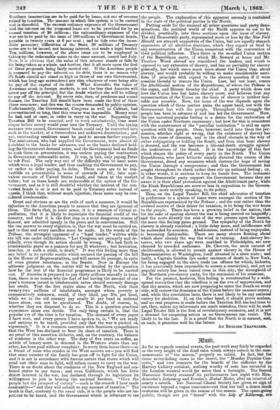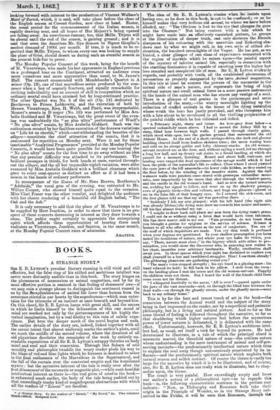As far as regards musical events, the past week may
fairly he regarded as the very height of the dead calm which always ushers in the com- mencement of • the season," properly so called. In fact, but for those never-failing oases in the desert, the "Monday Popular Con- certs," and two concerts for the benefit of the sufferers by the Hartley Colliery accident, nothing worthy of note has occurred in the London musical world far more than a fortnight. The Sacred Harmonic Society resumed its performances last night with Men- delssohn's Lobgesany and Rossini's Slabat Maier, after an interval of nearly a month. The National Choral Society has given no sign of existence beyond a vague announcement that our half a dozen stock oratorios will be given in the course of the season. The opera-going public, though not yet "bored" with the Lily of Killarney, are
looking forward with interest to the production of Vincent Wallace's Maid of Zurich, which, it is said, will take place before the close of the English season at Covent Garden, now close at hand. Easter, the usual period for the commencement of the Italian season, is rapidly drawing near, and all hopes of Her Majesty's being opened are fading away. An unwelcome ramour, too, that Mdlle. Titjens will he absent until the end of the season, is gaining ground ; and it is said that even the dauntless Mr. Gye demurs to Signor Giuglini's modest demand of 1000/. per month. If true, it is much to be re- gretted that /sildlle. Titjens, to whom every one was looking to supply the place of Griai, should desert us during such an eventful season as the present bids fair to prove.
The Monday Popular Concert of this week, being for the benefit of M. Vieuxtemps, who made his last appearance in England previous to a prolonged tour on the Continent, attracted an audience even more numerous and more appreciative than usual, to St. James's Hall. The concert commenced with Meiadelssolm's Quartet in A minor (Op. 13), one of that marvellous series produced by the com- poser when a boy of scarcely fourteen, and equally remarkable for striking individuality and an amount of skill in composition which no ordinary mortal could have attained but by long-continued practice. The other Quartet was No. 5 of the set (Op. 18) dedicated by Beethoven to Prince Lobkowitz, and the execution of both by Messrs. Vieuxtemps, Ries, H. Webb, and Piatti, was irreproachable. Mozart's sonata in D major (No. 10) was performed by Miss Ara- bella Goddard and M. Vieuxtemps, but the great event of the even- ing was undoubtedly- the "Be plus ultra" performance of Woelf's " Ne plus ultra" sonata, by Miss Arabella Goddard. Such was the enthusiasm created by her faultless execution of the bravura variations on "Life let us cherish," which—notwithstanding the beauties of the altegro—constitute the chief attraction of the sonata, that it is announced for repetition on Monday next. Were it not for those inestimable "Analytical Programmes" provided at the Monday Popular Concerts, it would have been quite possible for any one hearing the " Ne plus ultra" sonata for the first time to go away without an idea that any peculiar difficulty was attached to its performance. The brilliant passages in thirds, for both hands at once, carried through- out the allegro, and the all but impossible eighth variation, were alike executed by Miss Arabella Goddard with a brilliant clearness which gave to every semi-quaver as distinct an effect as if it had been a minim in the hands of ordinary performers.
In consequence of the illness of Mr. Sims Reeves, Beethoven's "Adelaide," the vocal gam of the evening, was entrusted to Mr. Wilhye Cooper, who showed himself quite equal to the occasion. Miss Clari Fraser was the other vocalist, and delighted the audience with her chaste rendering of a beautiful old English ballad, "The Oak and the Ash."
It is only necessary to add that the place of M. Vieuxtemps is to be supplied by Herr Joachim, in order to show that there is no pro- spect of these concerts decreasing in interest as they draw towards a close. The public ought certainly to appreciate the enterprising spirit which affords them opportunities of hearing three such violinists as Vienxternps, Joachim, and Sainton, in the same month, at the Monday Popular Concert rates of admission.
AMATEITR.































 Previous page
Previous page